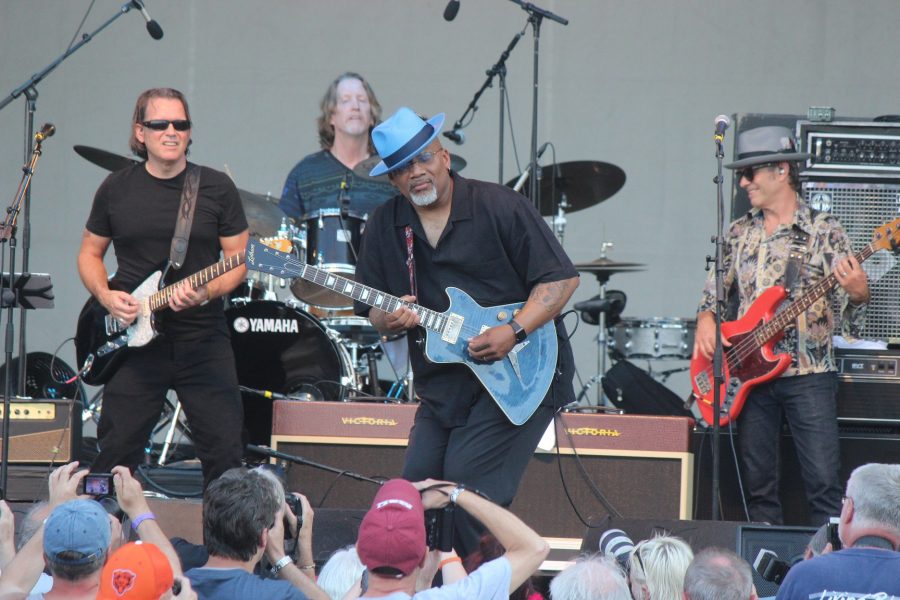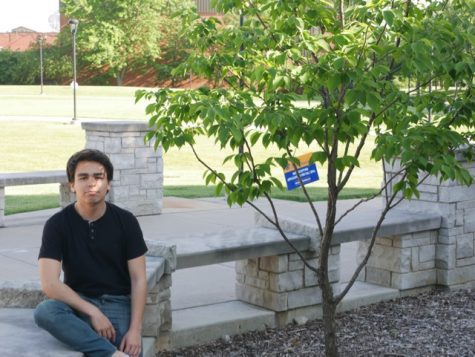Summer Blues at Grant Park
Toronzo Cannon jammed on his blue guitar alongside Tommy Castro and the Painkillers.
June 21, 2016
Chicago’s got the blues and lots of it to go around.
Grant Park held a festival from June 10-12 for many big blues ensembles, to an audience of what seems to be thousands upon thousands of Chicagoans looking to listen, clap and dance.
Speaking of the experience as a whole, it is more than enough reason for any music lover to expand their knowledge of blues, both old and new. Appearing every day at the park, viewing the friendly and anxious public on the lawn and the venues, and simply admiring the scope at which blues emerges from the Petrillo Music Shell is a treat for myself and thousands more listeners.
Not to mention, it’s free admission for anyone. No priced tickets, no RSVP; just show up, sit back and enjoy the music. That alone was relieving for me to just feel welcome, as though it were a street performance, only cranked up to 11.
Each night brought on different acts, solid in their respective sounds and keeping the pace of the blues rolling, whether it was music from the bands’ own creations or borrowed classics from the history of blues music.
Friday night was the celebration of the 45TH anniversary of the Chicago-based independent blues label Alligator Records. Saturday night saw the performance of experienced soul and rhythm and blues acts. Sunday night concluded with an all-around tribute to the Chicago blues player Otis Rush.
For anyone who is looking to listen to blues music but afraid of not knowing where to start, this festival was very enlightening and welcoming for even casual listeners. I wouldn’t be ashamed to say I loved the music, even though I did not know many of the acts that appeared on stage.
It was the sheer power of the acts’ music and personality that won me over, and once I heard those powerful blues riffs, the strong brass and electric organ chords and the clear vocal style of the performers, it was enough of a sweet sound to jam along to.
Not only were the acts spectacular in their own hits, but each act showed styles that expanded the role of blues in other sounds. Of course you’ve got your rhythm and blues, rock and roll and soul, but other genres such as electric blues, psychedelic blues and funk flowed from the performances.
The most memorable acts came from plenty of bands, such as Tommy Castro and the Painkillers, Lil’ Ed and the Blues Imperials, “Soul Queen of New Orleans” Irma Thomas, Eddy “The Chief” Clearwater and some select acts from Otis Rush’s tribute. Not only was their soul and power brought out from the blues played in each respective act, but all shared a strong bond to the audience and their work, called the spreading of the love.
Castro’s band of Painkillers sang of reaching a “Common Ground”, to which all people stand on, played through a classic Americana guitar sound. Guest Toronzo Cannon proved to be the contrast to Castro’s band, as his affinity of Chicago blues and humorous lyrics about bringing a grenade and knife to a gun showdown reflected Cannon’s youthful attitude, singing, “That’s the Chicago way.”
Lil’ Ed’s band was another breath of fresh air as the leader was even wilder and hardened in playing his guitar bottleneck style. With a full electric string set, Lil’ Ed and the Blues Imperials chugged along in hard rocking pieces along with guest harmonist Corky Siegal. Plus, Lil’ Ed had a pretty cool attire that day, that of a multi-color dotted vest and a sequined square top hat.
The main pull behind Irma Thomas’ performance was the feeling behind her songs of love and a woman’s blues life. From “You Can Have My Husband (But Please Don’t Mess With My Man)” to “Hip Shakin’ Mama”, Thomas’ vocal range and power blended well with the soul performance supplied by her backing band.
The tribute to Otis Rush was especially noted for having Mayor Rahm Emanuel show up in person on stage to welcome Rush onstage and present him with a decree that June 12 is now recognized as Otis Rush day, in commemoration to his near five decades of blues performance and influence on artists such as Santana, Steve Miller and Eric Clapton.
“Otis, this is from the city of Chicago,” Emanuel said. “Whereas Otis Rush became a Chicagoan in the 1950s, after having been inspired by the musical talents of the great Muddy Waters, and whereas as a self-taught musician, Otis Rush cultivated his own distinctive musical style and method by playing guitar left handed, the instrument upside down, and whereas Otis Rush is a true leader in helping pioneer music that became known as the West Side south of the Chicago Blues.
“I Rahm Emanuel do hereby proclaim June 12, 2016 to be Otis Rush Day in Chicago.”
Rush accepted the proclamation, shouting “Oh yeah!” twice and thanking the audience and stage members.








